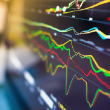The global market outlook is already hazy in light of the COVID-19 pandemic, and the upcoming US presidential election adds another layer of uncertainty. In this excerpt from our Midyear Global Investment Outlook, Sonal Desai, Stephen Dover, Michael Hasenstab and Ed Perks offer their views of today’s investment landscape, including the upcoming US elections and economic outlook.
by Sonal Desai, Stephen Dover, Michael Hasenstab, Ed Perks, Franklin Templeton Investments
The United States is currently going through a period of what I would call intense soul-searching, long overdue and much needed. Unfortunately, times like this also lead to what I would call political opportunism. We are certainly seeing that on every side. Looking through the recent, quite tragic events in the United States, and going forward into the latter half of the year, we need to recognise that the US elections are still four months away. While the polls seem to be showing the Democrats are out in front, a lot can change. Let us remember that the economy was roaring five months ago.
Even without a full Democratic or Republican sweep in November, it is hard to overstate the level of uncertainty in regard to what the likely path of policy will be. Over the next several months, we will get greater detail on what the policy platform of the Democratic presidential and vice-presidential candidates will be, which should help shape our outlook on different sectors. On the Republican side, in the case of a sweep, the outlook is more known. And if it’s not a sweep—if we have a president who is of a different party than the Congressional majority—any incoming administration will find it hard to dramatically change policies.
So, putting it into perspective, over the next few months we will have much greater detail on what the policy platforms will be and as the polls become clearer, we will have views as to how the market impact will play out.
Overall, we believe it is a time to be active as investors. There is not a single asset that is unilaterally a buy right now, in our view. More than ever, selectivity by country, by sector, by asset class, and within asset classes by industry and individual companies is required. The importance of thoughtful, skilled bottom-up research cannot be emphasised enough in the current environment.
The risks to the economic outlook are very real. Our baseline outlook assumes sensible reactions as we are looking at data-driven conclusions as opposed to just knee-jerk reactions.
Much of the recent stock market volatility can be attributed to changes in the outlook for COVID-19 infections. In my view, equity markets’ resilience in the face of rising disease uncertainty demonstrates that investors may be primarily concerned with reserve bank actions and governments’ fiscal stimuli globally, largely ignoring economic fundamentals and the high degree of uncertainty surrounding the pandemic’s path. News around the infection rate, potential vaccines, and better medications to heal the sick will likely continue to roil the markets.
The key question looking ahead is whether the stock markets will continue to climb based on monetary and fiscal responses or whether something could make equity markets unwind. Typically, bear markets happen when there is monetary tightening—I think that is unlikely to happen. This time around, the negative catalyst could be economic disappointments relative to expectations for a sharp, “V-shaped” recovery. There are several factors that are currently affecting the markets, one being historic unrest around racial injustice and the upcoming US elections.
I am very heartened to see how many companies have spoken out about racial injustice and societies’ needs. When social unrest is unaddressed, it can affect the overall economy. Increased diversity and greater fairness are good from an economic and societal perspective. Companies will be impacted more than ever by their engagement in societal issues. Many, if not most public companies, are moving toward a wider stakeholders’ model of stewardship of their firms. In my view, environmental, social and governance (ESG)-focused investing will become increasingly mainstream, and many investors will screen for companies that take these matters seriously.
The US presidential candidates present two of the most divergent political approaches in recent memory, with policy differences on how to address the recovery from COVID-19; the tax system; the role of government in health care; immigration and the workforce; whether and how to address climate change; and whether to take a unilateral or multilateral approach to foreign policy.
The US Congressional outcome is as important as who wins the US presidency, and the market may experience additional volatility as we approach the election. The markets have not yet priced in the potential for large increases in personal capital gains taxes, corporate tax increases, and additional business and environmental regulations if the Democratic party wins the US presidency as well as the majority in the US Congress. There would also likely be increased attention to companies and sectors that will benefit from a Democratic party sweep.
One of the biggest economic trends going forward may be the relocation of supply chains to be closer to developed countries because of trade tensions, sovereignty issues, and lower cost differentials. I believe there will be a big move back to the United States, particularly the Midwest region of the United States. The employment cost differential of manufacturing in China vs. the United States has dropped dramatically as the cost of employment in China has risen. More importantly, automation, robotics, lower energy costs, and higher productivity in the United States make a case for industries to return to the United States.
The US economy is about 70% dependent on the consumer, and we may go back a little bit more to 1960s-1970s levels where industrial spending (CapEx) was a greater part of the economy. This would make the US economy much more balanced.
While we are likely to see a much-needed swell of optimism in the summer months as people venture out to enjoy some sunshine, dine outdoors, patronise reopened businesses and head for vacations, the realities of the current economic crisis and the health crisis will remain omnipresent. Months ago there were hopes that many jobless claims in the US would prove temporary, but many temporary claims (six-months) are increasingly at risk of becoming permanent job losses as businesses close for the second time or become insolvent. Historically, it takes years for unemployment to return to pre-crisis levels—after the 2008 global financial crisis it took more than six years.
Adding to the complexity of the crisis is the precarious state of the world that existed before the COVID-19 pandemic. Escalating geopolitical risks, rising trade tensions and political polarisations have made it highly difficult for countries to find the collective good will needed to address both domestic and international challenges. In the United States, an increasingly divided population and polarised politics have undercut the cohesion and compromise needed to solve critical issues. These types of political polarisations are occurring around the world, making it difficult to design collaborative solutions to the most profound economic crisis in the post-war era.
Additionally, the deglobalisation trends that were already underway before the pandemic erupted are likely to accelerate during the ongoing crisis. As countries increasingly focus on health concerns, national security and other domestic issues, globalisation is at risk of being further cast aside. Intensifying trade tensions between the United States and China are a prominent concern but are also just one example among many other decaying trade relations around the world. Structural shifts toward domestic production and regional supply chains would have major implications for the global economy and financial markets.
We continue to see the challenges of recovering from the current virus-induced recession as global in nature. The US economy remains more dynamic than many others though, and the US equity market has benefited from the rapid and unstinting support of the Federal Reserve. However, it is also vulnerable to a second wave of infection from the coronavirus. With significant levels of fiscal and monetary stimulus already in place, markets are taking an optimistic view of the balance of risks and opportunities.
Select companies have been especially well-positioned to take advantage of rapidly changing consumer and business preferences we have seen over the past few months. Accelerated adoption of technological solutions to allow remote working and new ways of conducting business have boosted the fortunes of many companies in the technology sector. We expect these transformational changes to persist even as the immediate driver of the change eases with the virus threat.
As the restructuring of the economy progresses, we expect new businesses to take up the slack left by legacy activities that will not bounce back as quickly, if at all. However, the recovery is unlikely to be smooth and any setbacks to the optimistic assumptions currently gaining dominance may see sharp declines in market confidence.
The need to make decisions about the ongoing provision of government support for individual consumers as well as businesses is complicated by the impending US election. The highly charged political climate in the United States may make longer-term policy harder to deliver, if it offers political advantage to one party or the other. For investors, there’s also a heightened risk that inequality and populism will lead to rising tax rates and regulatory oversight, particularly in key sectors such as technology.
We believe that for the balance of the year, politics will have a growing impact on investment decisions. However, the health and related economic variables are likely to be more important than narrow, traditional political considerations.
Get more insights from our investment professionals. Check out our Midyear Global Investment Outlook.
For timely investing tidbits, follow us on Twitter @FTI_Global and on LinkedIn.
What Are the Risks?
All investments involve risks, including possible loss of principal. The value of investments can go down as well as up, and investors may not get back the full amount invested. Stock prices fluctuate, sometimes rapidly and dramatically, due to factors affecting individual companies, particular industries or sectors, or general market conditions.
Important Legal Information
This material is intended to be of general interest only and should not be construed as individual investment advice or a recommendation or solicitation to buy, sell or hold any security or to adopt any investment strategy. It does not constitute legal or tax advice.
The views expressed are those of the investment manager and the comments, opinions and analyses are rendered as at publication date and may change without notice. The information provided in this material is not intended as a complete analysis of every material fact regarding any country, region or market.
Data from third party sources may have been used in the preparation of this material and Franklin Templeton Investments (“FTI”) has not independently verified, validated or audited such data. FTI accepts no liability whatsoever for any loss arising from use of this information and reliance upon the comments opinions and analyses in the material is at the sole discretion of the user.
Products, services and information may not be available in all jurisdictions and are offered outside the US by other FTI affiliates and/or their distributors as local laws and regulation permits. Please consult your own financial professional or Franklin Templeton institutional contact for further information on availability of products and services in your jurisdiction.
Issued in the U.S.by Franklin Templeton Distributors, Inc., One Franklin Parkway, San Mateo, California 94403-1906, (800) DIAL BEN/342-5236, franklintempleton.com-Franklin Templeton Distributors, Inc. is the principal distributor of Franklin Templeton Investments’ U.S. registered products, which are not FDIC insured; may lose value; and are not bank guaranteed and are available only in jurisdictions where an offer or solicitation of such products is permitted under applicable laws and regulation.
CFA® and Chartered Financial Analyst® are trademarks owned by CFA Institute.
The post Presidential Election Complicates US Market Outlook appeared first on Beyond Bulls & Bears.
This post was first published at the official blog of Franklin Templeton Investments.












